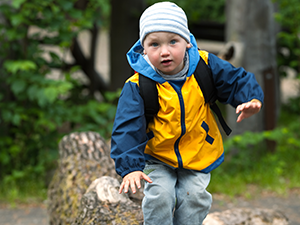Winter play – Child
 Winter is a great time to for children learn about what is safe, what is not safe and why when playing outside. They start to explore some risk-taking. They learn it’s ok to try new things and make mistakes – it’s how we learn!
Winter is a great time to for children learn about what is safe, what is not safe and why when playing outside. They start to explore some risk-taking. They learn it’s ok to try new things and make mistakes – it’s how we learn!
Did you know?
Being in different outdoor spaces provides simple challenges for children to practice their risk assessment and problem-solving skills. Wet and slippery conditions in winter provide lots of opportunities to practice these skills.
When children learn to solve problems on their own they develop independence and self-confidence as well as their thinking skills.
Add language
Nature’s diversity in winter provides occasions to use different language that may not be used in other play spaces. Talk about what you see and experience. Introduce some new, more specific words e.g. “Look at the moss growing on the bark”. Compare what you see e.g. some trees have lost all their leaves, some trees still have leaves. Ask some “why” and “what if” questions to prompt thinking and reasoning.
Other development
Clambering over logs and attempting to climb trees develops gross motor skills, strength and agility.
Outdoor play in winter provides limitless opportunities to develop problem-solving skills. For example, by constructing a basic cubby house with sticks and branches, children will learn to consider space (how big it should be), materials (strength and shape), and angles (how it will stay up in the wind or rain) – all early maths and science concepts!
Variations
Make a list together of things to find on your winter walk. Tick them off as you find them. This gives you a chance to show a reason for writing. Children get to see what you say written down. Understanding that spoken words can be written down is an important step in early literacy development.
All the activities listed on our “Play Ideas’ page can be applied across different age groups. Check out how the winter play can be fun for babies, toddlers and playgroups.
Activities listed under “child” are suitable for children aged 3 years and older. Children of this age enjoy more complex activities where they can develop their skills and use their imagination while playing with friends.

